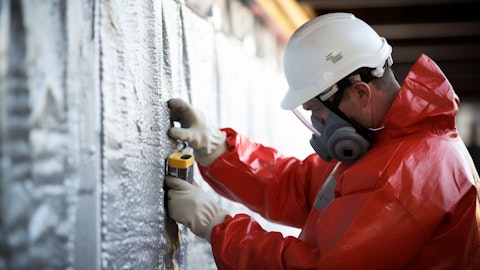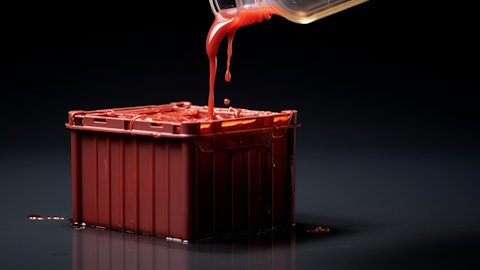And the oil and gas market is — industry in general is known for being relatively slow when it comes to embracing new technologies. But we’re blocking and tackling and going after business and moving ahead as quickly as we can. I mean, I can say that we are starting to see things accelerate a little bit. And it’s part of the reason why we are looking to hire, as I mentioned before, looking to hire and looking to make investments in this business because we are starting to see some of the milestones and some of the things happen where we’re now comfortable with how the growth is going. And we want to make sure that as that business increases, we’re able to support it and able to take advantage of it.
Tim Clarkson: Right. Okay. Let’s switch to the compostable a little bit. Now does that product really differentiate itself against the competition? I mean, can you find specific applications where somebody says, “Yes, we want to do a business with this Natur-Tec stuff rather than the competition because of A, B and C.” I mean does that show up? Or is it just another compostable product?
Matt Wolsfeld: No, that definitely shows up. I mean, we certainly sell commodity products, that are — some of the Natur-Tec products certainly are commodity products as far as selling certain bin liners and things like that. But the majority of our business and some of the larger projects that we’ve rolled out, we’ve developed proprietary resins for these companies to be able to manufacture, successfully manufacture the products that they want to be compostable on their own manufacturing equipment. And that’s something when they’ve tried either competitors or tried just base resins or try to develop something internally, they haven’t been able to do. And so really, the value add and the benefit that the Natur-Tec group is providing is the ability to tailor something specifically to a customer that ultimately leaves us in a position where we’re able to supply them with a product and develop a longer-term partnership with companies where they want to make compostable products.
And so I think the growth that we’re going to see in the coming 12-months, 24-months are going to be these opportunities, where the product that we’re selling is not replaceable by other compostable resins. It’s going to be — it’s specifically developed by us in partnership with some of these main suppliers.
Tim Clarkson: Right. Super. And would you say at this point, Natur-Tec is profitable on a stand-alone basis?
Matt Wolsfeld: Natur-Tec is definitely profitable on a standalone basis. That’s been the — one of the most exciting things for us over the past six quarters really is seeing the growth and the profitability of Natur-Tec and the contribution that we’re seeing from the overall Natur-Tec business to the bottom line profitability. Certainly, one of the key things that I think people that really follow the company have a difficult time understanding is the — over the past four, five quarters, we’ve seen the joint venture contribution be relatively flat or even down some. And we talked a little bit about how the big joint venture that we have in Germany, the amount of income coming from that joint venture has gone down significantly over the past two or three years because of some of the difficulties with the overall German economy.
And the growth that we’ve seen from a profitability standpoint as a total company has been where the Natur-Tec is making a significant contribution. Oil and gas is profitable, making a contribution. So certainly my — certainly what I hope for and what I — is that as we see the tailwinds as far as what’s going on with some of the joint ventures, hopefully that turns around a little bit and we get back to the point where we’re seeing the growth at the joint venture level that, that’s going to be an additional tailwind where you really be able to see the earnings acceleration.
Tim Clarkson: Right. Well, great. I mean, I’m pleased obviously pleased with how things are going, and I expect things to continue. And I mean one thing I’ll make, I don’t know why I’m saying this, but I mean, it’s this unbelievable how long it takes people to be convinced of technologies. Everybody thinks people want to change and do innovative stuff, but the experience at Northern Technologies historically just shows that it takes 10 years sometimes for people to see the obvious and start to change their behavior. So I’m glad you guys are hanging in there. Everything you’re doing is clearly not only making money but it’s also helping the environment, even the tank technology, obviously. So great quarter.
Operator: Our next question comes from John Bair with Ascend Wealth Advisors.
John Bair: In looking at your slide deck, the slide with your joint venture operating income has been relatively steady in that 10% to 11% range over the past few years. So I’m wondering if there’s opportunities there to expand that segment of your business. I know you just referenced hopefully that overall things might increase would prevent or provide a good tailwind. You did in your prepared remarks mentioned that China has shown some improvement. Didn’t really mention anything about India. I’m just kind of wondering what you’re seeing there.
Matt Wolsfeld: Sure. As far as what we’re seeing in India, the investment that we made to acquire the additional 50% of HNTI, which we can call ZERUST India, was made at the end of 2001, so the impact started coming in, in 2002. We saw a pretty dramatic drop-off in our 2000 — after the acquisition, we saw a drop-off in the expected contribution. They were contributing about $0.2 million to our total profit. And fiscal 2023, this contributed about $1.5 million. And this year, we expect them to contribute close to $2 million of total operating bottom line net income contribution. So the Indian business has been strong. We’re seeing there the growth in sales, growth in overall profitability. And so it’s been very positive. The investment that we made — right when we made the investment, we saw a little bit of a decline.




